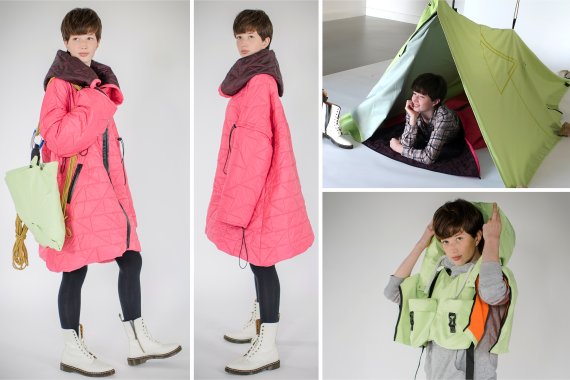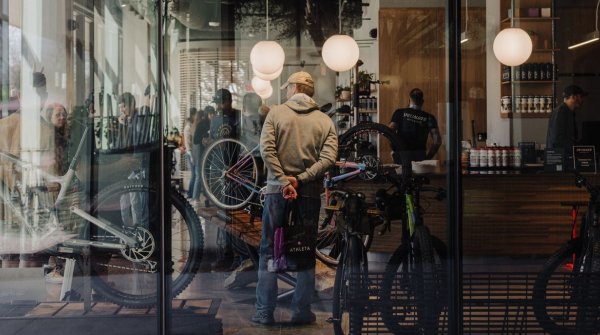
The ISPO Academy Masterclass has a clear goal: to introduce young designers to the sports industry and thus involve the "customers and decision-makers of tomorrow" in the design process of today's sports products. Design students from nine international schools took part in the third Masterclass to jointly develop ideas for the sportswear of the future.
"With the Masterclass, we want to develop new perspectives for functional clothing. We want to rethink function, to imagine new scenarios in light of the rapid changes that are taking place," explains Nora Kühner. Participants will develop products that "work, fit our times and, in the best case, look ahead." The sports industry could benefit from this, she adds.

In turn, participants in the ISPO Academy Masterclass gain valuable insights into an industry that "offers exciting and diverse challenges," says the renowned sports fashion designer, who developed the concept of the 2015 Masterclass together with design colleague Rolf Günther.
With the motto "Sports New Clothes - modular - versatile - sustainable" (translated: "Des Sports New Clothes - modular - versatile - sustainable"), the thematic framework of the Masterclass 2018 was predefined. However, the participants were completely free to come up with their own ideas. Nevertheless, three main topics quickly emerged that occupied all design students from Austria, Sweden and Finland to Taiwan:
- Health: the relationship between the human body, movement and textiles, as well as the impact of clothing on health and regeneration, is a topic that occupied the participants in the Masterclass Workshop and will also be a focal point at ISPO Munich 2019.
- Humanized technology: how far do we go when incorporating technology into functional clothing? To what extent do we interfere with the human body? What responsibility do designers and manufacturers bear here? Ethical questions about technology were also discussed in the Masterclass.
- Transformability: The possibility of using things many times and for different purposes is an important trend topic for students and the sports industry, says Kühner. This goes beyond just multisport, he said. Young people are increasingly demanding clothing that can accompany them from morning to night, that can be adapted and adapted to different situations, the expert says.
Two concepts were actually implemented in prototypes, both of which dealt with the topic of transformability and adaptability.

Five design students conceived a suit that offers various combination and wearing options thanks to different textile layers: from an office look to a sports outfit to a suit for an evening event. "The idea behind this is adaptability," explains Kühner. "Sportswear 'repurpose' and transfer it into new scenarios."
The idea is fundamentally not new. "The sneaker is the best example," the expert explains. "It takes me from trail running to the opera in the evening". Kühner knows that "this cross-discipline thinking, combining sports and style, is what young people are concerned with." The sports industry also has to deal with this more, he says. "People don't shop like they used to, with one outfit for work, one for everyday and one for sports. The boundaries are dissolving more and more." This can already be seen in the dress codes of the working world, which are becoming increasingly casual, he said. Here, the sports industry in particular has the potential to become an "every-day-compagnon," says Kühner. "Because sportswear is functional, pragmatic and easy to maintain" - and can be "very stylish," Kühner emphasizes.

Two participants brought the idea of turning a jacket into a tent to the master class. The main reason behind this is the "desire for reduction, also in terms of equipment," says the fashion expert. In addition, there is the need for flexibility, for example, to be able to decide spontaneously to spend the night outside or to camp on the open-air site.
The result of these ideas and needs is a lightly padded quilted jacket that converts into a sleeping bag. Two additional layers that can be converted into a tent complete the jacket.

The concept of the transformable jacket was very well received in the industry. The sustainability label bluesign invited Kühner and two master class participants to its conference in Milan to present the jacket. "The international response was great," Kühner reports. The experience again made it clear that she had her finger "on the pulse" with the Masterclass. "Transformability was also a keyword for the conference, so it was a great opportunity to tie in with that."
Especially for the generation of digital natives, transformation has long been an everyday reality. "Transformation is taking place in all areas," explains Kühner. "Not only has our working world and everyday life become more digital, the sports industry will also have to transform itself in order to operate in line with the times," the expert emphasizes.

The fourth ISPO Academy Masterclass in February 2019 will focus on the topic of "Desport's new clothes" will continue. Kühner reveals this much already. "We're sticking to the guideline: New clothes, new scenarios, rethinking functions - given the possibilities in technology and science."
Health will also play a major role. Otherwise, Kühner wants to be "surprised by what the new participants bring to the workshop." But Kühner is already certain that they will again be exciting, challenging and promising ideas.
 Sports BusinessThe future of the bike industry: 6 innovative bike stores
Sports BusinessThe future of the bike industry: 6 innovative bike stores
- ISPO awards
- Mountain sports
- Bike
- Design
- Retail
- Fitness
- Health
- ISPO Job Market
- ISPO Munich
- ISPO Shanghai
- Running
- Brands
- Sustainability
- Olympia
- OutDoor
- Promotion
- Sports Business
- ISPO Textrends
- Triathlon
- Water sports
- Winter sports
- eSports
- SportsTech
- OutDoor by ISPO
- Heroes
- Transformation
- Sport Fashion
- Urban Culture
- Challenges of a CEO
- Trade fairs
- Sports
- Find the Balance
- Product reviews
- Newsletter Exclusive Area
- Magazine




